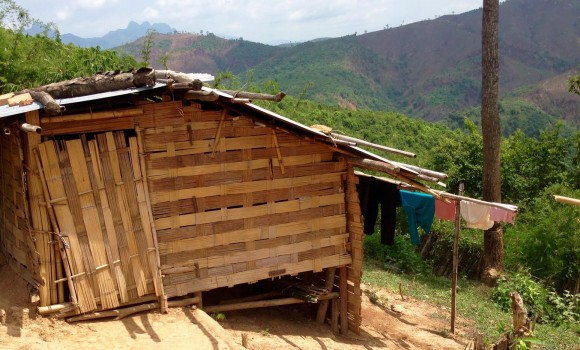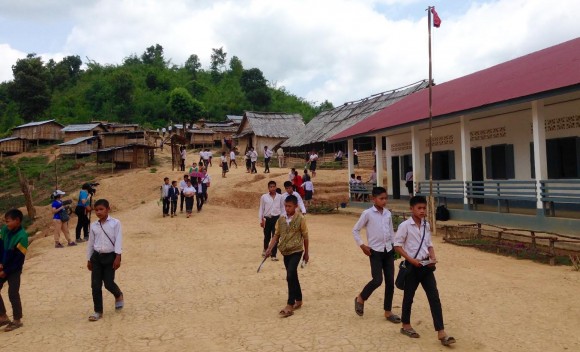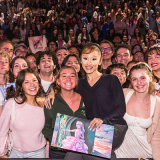The Value of Education – Destination Laos
September 1, 2015
EDITOR’S NOTE: When I was looking for students to write about their experiences abroad this summer, one name kept coming up over and over again, from students who took the class to Associate Dean Michael Kowalski.
“You have to get Bryce,” they all said. “He is a great story teller, and write something great!”
They were referring to Bryce Cyrier (BFA/Creative Producing ’17), and they were absolutely right. Cyrier wrote this fantastic blog post about his experiences in Laos, and he really makes you feel like you are there.
Let me set the scene for you…
We’re in a hut on the side of a mountain in the jungles of northern Laos. Deng, a seventeen year-old Laotian girl at Pou Luong Lower Secondary School, crouches on the dirt floor. She blows softly into a fire as streams of morning sunlight poke through the bamboo walls. Smoke billows and begins to rise.
Meanwhile, Sarah, our group’s main shooter, hunches under the doorway with a mounted C300. She racks focus on Deng scooping rice into a pot. School is about to start—but first, Deng must prepare breakfast for her four siblings.
Outside the hut, I listen to Chantha, our translator, as she explains to the rest of us in hushed whispers, “This is where they live during the school week. They travel two hours from home by motorbike, if they can manage rides. If not…they walk.”
I shake my head in amazement and look out past Deng’s hut: I see a cluster of a dozen or more nearly identical huts—ramshackle boxes of bamboo and tin roofs just tossed together and teetering on the mountainside.

Now rewind about 8 months to a sunny fall day at Dodge College, when I first heard about the International Documentary Scholarship Program from Professor Jeff Swimmer. It sounded like the ultimate film-making adventure to me. In fact, Dodge’s travel courses were one of the things that first attracted me to Chapman. I liked the idea of working with a team in an unfamiliar environment and getting to tell a story about someone from a completely different culture. And to be able to work side by side in the field with professors and faculty? I was sold. I applied to the program in Fall 2014 and was thrilled to be one of twelve students selected for the scholarship.
Before I knew it, we were hurled head-first into an intense pre-production class with Jeff. We spent Spring 2015 doing research about Laos—its history, culture, politics, economy, geography, language, you name it—and presenting to the class on social issues and non-profit organizations that might make interesting films. Eventually, the twelve of us students were grouped into three teams based on our interest in topics.
My team had chosen to work with Community Learning International, an innovative Lao-based non-profit that seeks to increase access to education in remote villages in northern Laos. Topics to be pursued by the other two teams were the unexploded ordnance left over from the Vietnam War; and the pros and cons of eco-tourism in the context of elephant conservation. I was stoked for everyone’s films as we all dug in to develop our ideas.
Each team made contact with our organizations and quickly began to build rapport with them. Coordinating a shoot with people almost 10,000 miles away was not an easy task, but overcoming those challenges proved to be ideal preparation for the action-packed 10-days we would spend tromping through the jungle with all of our camera gear.

The shoot was everything I could have hoped for—and anything like what I expected. Thrust into a strange new world, we snapped right into action. It was hot, it was humid, and there was tons of work to do.
During our time in Laos, we traveled over 100 miles by van and close to 20 miles by boat. We shot in huts, schools, and learning centers, in libraries and people’s homes. From sun up to sun down (and sometimes before the sun came up), we were rolling the camera and asking questions and trying to figure out how to tell the best story.
Mike Kowalski, associate dean of Dodge College, was our faculty advisor and accompanied us throughout the shoot. His assistance (and comic relief) were vital in the development of our team and the ultimate success of our shoot.
In situations like those—having traveled halfway across the world with only a short time to get our coverage—the stakes were high and emotions ran strong. It was real life, real time, and we didn’t understand a thing people were saying. (That’s doc filmmaking for you.) Before we knew it, we had a couple hundred gigs of footage stored on our hard drives, some new Laotian friends to keep in touch with, and a whole lot of editing ahead of us.
Perhaps my biggest take away from the trip—both the filmmaking experience and my exposure to the children in Pou Luong—was to never take for granted the value of an education. Every day, dozens of kids in Laos (and countless others all over the world) make incredible sacrifices to attend school. As we’re starting up fall semester, I ask myself more frequently: What sacrifices am I making for my education?
I believe the opportunities Dodge’s travel courses give us to work through our challenges in such a fast-paced, high stakes situation is invaluable in our development as filmmakers and our progression as human beings. So if you’re interested in making docs—whatever your major— apply for the International Documentary Scholarship Program. It’s your window into the world and a top-notch experience in learning how to make a difference in it.


